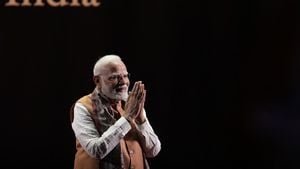The recent outbreak of hostilities between Israel and Hamas has sent shockwaves through the international community, with reactions ranging from condemnation to calls for action. This increasing intensity of conflict, particularly following the tragic events of October 2023, has not only resulted in significant loss of life but has also ignited global discussions about accountability and international law.
On November 21, 2024, the International Criminal Court (ICC) issued arrest warrants for Israeli Prime Minister Benjamin Netanyahu and Defense Minister Yoav Gallant. These warrants responded to numerous allegations including war crimes related to the Israel-Palestine conflict. Notably, the ICC accused them of committing acts such as starvation as warfare and other crimes against humanity during the current military campaign which has devastated Gaza.
Despite the gravity of these findings, the United States rapidly voiced its disapproval, declaring the warrants 'outrageous' and indicating its unwillingness to support the ICC's decisions. The Biden administration's response emphasized its strategic partnership with Israel, effectively prioritizing diplomatic relations over international legal standards at this juncture.
International reactions, though, have diverged sharply from the U.S. stance. Countries such as the United Kingdom, Canada, and Ireland have signaled their readiness to comply with the ICC's warrants. British officials remarked they would be "required" to act on the warrants if Netanyahu stepped foot on their soil. This aligns with Ireland's strong public commitment to international law, with Foreign Minister Simon Harris affirming Ireland’s readiness to arrest Netanyahu should he visit.
Relations between Ireland and Israel, especially, have plunged since Dublin recognized Palestinian statehood. The acknowledgment came after various high-profile incidents, such as the deaths of civilians amid Israeli military operations, heightened tensions. Harris' assertion encapsulates the shift: “Yes, absolutely. We support international courts and we apply their warrants.” Such sentiments reflect both political will and changing public opinion across Europe, where sympathy for Palestinian victims is growing stronger amid reports of heavy casualties.
Meanwhile, Israel continues to conduct military operations against Hamas with claims of eliminating high-profile commanders linked to the October attacks. The Israeli Defense Forces reported killing five Hamas militants, identifying key players behind the attacks on Israeli settlements. The operation, which Israeli officials claim is aimed at preventing Hamas from regrouping, has reportedly taken thousands of lives, with tolls indicating heavy civilian casualties. Gaza’s health ministry has voiced concerns over the humanitarian crisis exacerbated by these military actions.
The aftermath of these military actions has seen international scrutiny deepen. Not only is the humanitarian situation dire, with infrastructure extensively damaged, but the political fallout is potentially transformative. Nations are grappling with how best to respond to both the humanitarian needs of Gaza and the legal ramifications of supporting or opposing actions taken by Israel. Discussions about introducing sanctions or various forms of diplomatic pressure against Israel are stirring among several nations, particularly within the European Union.
Hungary's Prime Minister Viktor Orban has publicly supported Netanyahu, offering him opportunities for visits and reinforcing Israel's position within certain western alliances. This balancing act, between nations willing to comply with the ICC and those defending or dismissing the warrants, highlights the chasm between views on international law and state behavior.
Germany and France have opted for cautious responses, stating their commitment to international justice without endorsing or rejecting the ICC’s rulings outright. France has noted its “attachment to the independent work of the court,” but refrained from participating actively, exemplifying the struggle many European nations face between adhering to legal obligations and maintaining geopolitical alliances.
Across the globe, the response has been varied. Countries like Argentina and Czechia have declared intentions to ignore the ICC warrants for Netanyahu and Gallant, siding with Israel's perspective and echoing the sentiments expressed by the U.S. administration. This rift between hardline supporters of Israel and advocates for Palestinian rights indicates growing polarization on this issue.
The humanitarian impact remains evident, as the civilian population of Gaza bears the brunt of military escalations. Reports from local health agencies indicate extensive casualties and difficulties accessing basic necessities. Medics have reported dozens of casualties and missing persons following recent Israeli airstrikes, and humanitarian aid organizations are struggling to respond effectively.
On the international stage, discussions around potential ceasefires or peace negotiations loom large, with U.S. representatives acknowledging the complexity of the conflict. Some leaders are advocating for more assertive international mediation to avert the continuous escalation of hostilities. Meanwhile, public opinion across Europe shows signs of sympathy for Palestinian civilians caught amid the conflict, adding pressure on governments to rethink their foreign policy approaches.
Looking forward, the discourse around Israel, the ICC, and the broader Middle East conflict is likely to dominate international relations, reframing discussions on human rights, war crimes, and the role of international law. The effectiveness of the ICC's actions remains to be seen, especially as arrest warrants hang over Netanyahu's head against the backdrop of fierce military operations against Hamas.
Although domestic politics within Israel are tumultuous, with Netanyahu facing internal scrutiny as well, the repercussions of these military actions will have long-lasting impacts. The situation remains fluid as the world watches closely to see how legal, humanitarian, and political aspects converge amid an increasingly complex geopolitical environment.



